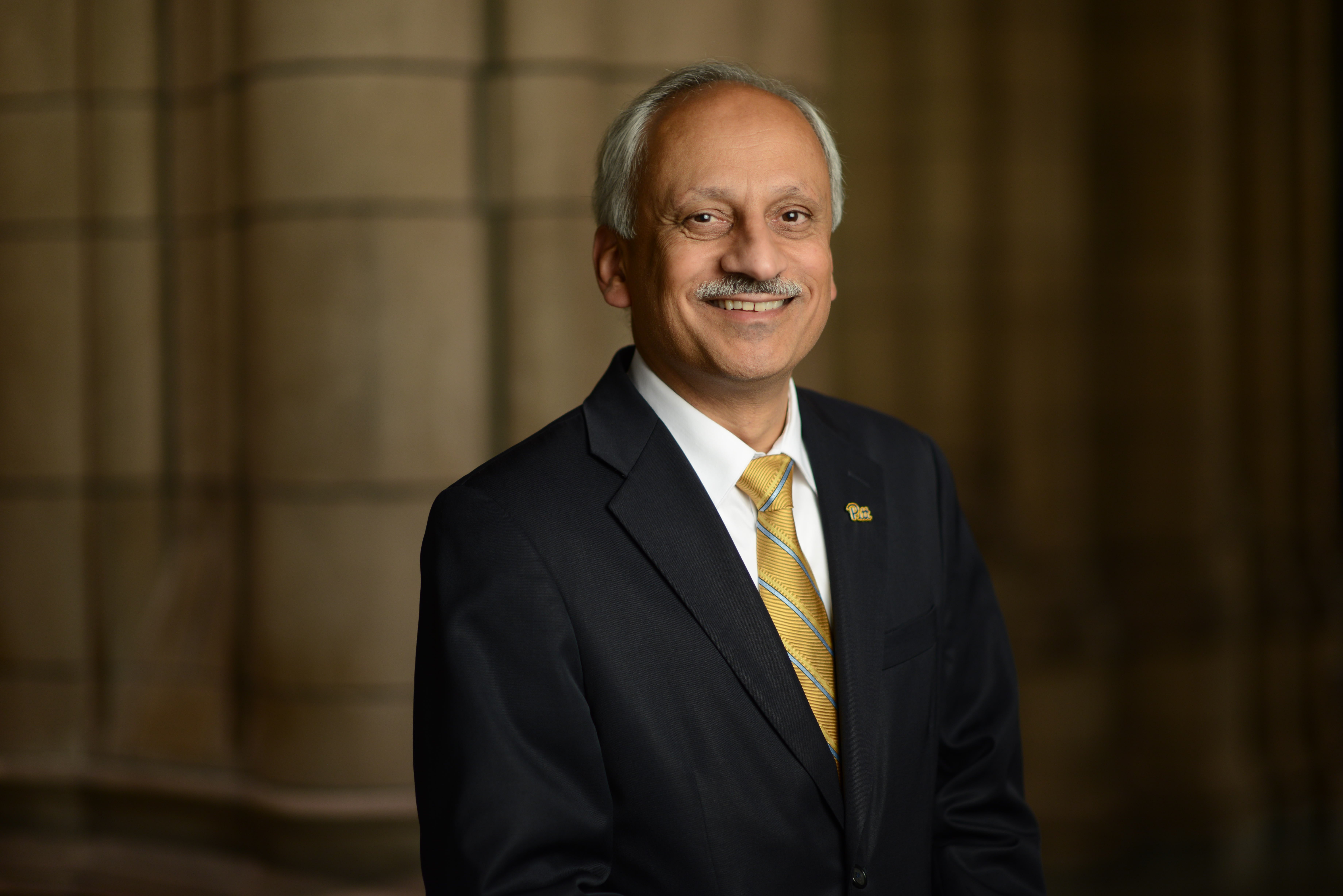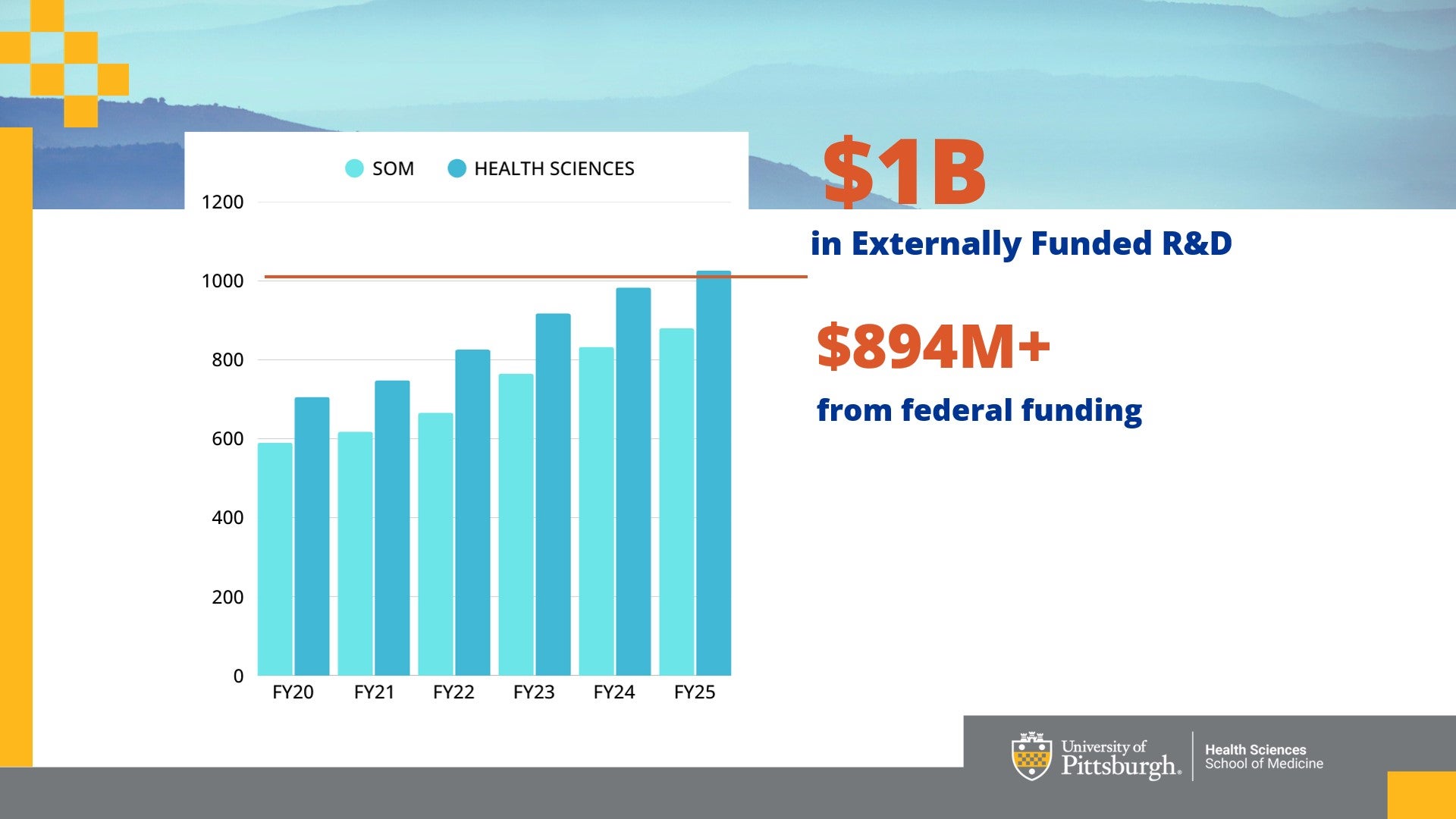 Caption: Anantha Shekhar, senior vice chancellor for the health sciences and John and Gertrude Petersen Dean of the School of Medicine.
Caption: Anantha Shekhar, senior vice chancellor for the health sciences and John and Gertrude Petersen Dean of the School of Medicine.
By Kat Procyk
Despite a year of changes to federal research funding, the University of Pittsburgh School of Medicine remains resilient, sustaining momentum by embracing opportunities in an evolving landscape.
In his State of the School address on Sept. 16, 2025, Anantha Shekhar, senior vice chancellor for the health sciences and John and Gertrude Petersen Dean of the School of Medicine, reflected on the significant changes impacting biomedical research and updated faculty and staff on how the school is charting a path forward.
The School of Medicine has weathered similar storms before, most notably during the unpredictability of the COVID-19 pandemic five years ago, during which Shekhar took the helm. Even during these times of change, the School of Medicine has advanced year over year by staying true to its mission—excellence in education, research and impact, strengthened through its clinical partnership with UPMC and community engagement activities.
“Our mission is the foundation for everything we have done and will continue to do,” Shekhar said. “It puts us on solid ground to deal with any crisis that comes at us. We will continue to adapt as needed to ensure that critical mission is served.”
A Push Toward Product Development and Commercialization
The path forward is anchored by eight core goals: research excellence, educational excellence, clinical excellence, translational excellence, people excellence, community engagement and health, commercialization and product development, and interprofessional education.
Among these, diversification of funding streams, commercialization and product development have emerged as top priorities, especially as federal funding faces increasing constraints. In April 2025, in partnership with Pitt’s Office of Innovation and Entrepreneurship, the Office of the Senior Vice Chancellor for the Health Sciences launched Pitt.INC, a new funding initiative designed to accelerate the transformation of lab-based discoveries into real-world products and treatments that improve patient care. In his address, Shekhar announced the first six “killer experiments” that have received funding from the program.
Shekhar also reported Health Sciences contributed 85% of Pitt’s record-breaking 444 invention disclosures in 2025; 15 start-ups and 109 U.S. patents driven largely by Pitt Health Sciences faculty.
Progress on each of these goals, updated since the 2024 State of the School to address emerging challenges, will be measured by new annual metrics. Over the next five years, they will be further refined and expanded to align with the School of Medicine’s evolving vision and strategic direction.
Navigating Funding Challenges
 With Pitt consistently ranking among the top 10 recipients of National Institutes of Health (NIH) research funding, Shekhar also stressed that researchers have remained resilient and extraordinarily productive, increasing grant submissions by more than 10%. Rankings for 2025 are not yet available from the NIH, but primary funding has seen a 21% increase to the School of Medicine since 2020. The school reported nearly $900 million in research expenditures last year, while the Health Sciences overall crossed the $1 billion mark for the first time.
With Pitt consistently ranking among the top 10 recipients of National Institutes of Health (NIH) research funding, Shekhar also stressed that researchers have remained resilient and extraordinarily productive, increasing grant submissions by more than 10%. Rankings for 2025 are not yet available from the NIH, but primary funding has seen a 21% increase to the School of Medicine since 2020. The school reported nearly $900 million in research expenditures last year, while the Health Sciences overall crossed the $1 billion mark for the first time.
“We will continue to double down on that and continue to be one of the top five to 10 institutions in the country in terms of research expenditures,” Shekhar said. “It’s a good reflection of the volume and quality of research that is happening here.”
To prepare for the anticipated cuts in indirect costs by the NIH, the School of Medicine has been seeking ways to reduce expenses and seek other sources of revenue. These include increasing space efficiency for laboratories and buildings and developing new growth programs that can diversify research funding from industry or philanthropy.
New Models of Health Care
A wave of new public and private initiatives rooted in personalized medicine and powered by cutting-edge technology is already underway.
A major step toward that is Generative Agentic Intelligence-Navigated Multiomics Medicine (GAINMED), which the School of Medicine and Vizzhy Inc., a global leader in artificial intelligence, announced in May 2025. GAINMED is a platform that brings deep biology and large computational capabilities together to build research assets, research-driven commercial products and, in the long run, transform health care.
The Pitt-Vizzhy lab, born from this partnership, will begin its first series of contract work in the coming weeks. The lab will be collecting data from cohorts in four countries, sequence participants’ whole genome, analyze nine omics and identify genetic predispositions for disease.
Large-scale data platforms are being built that are supported by generative artificial intelligence (AI) to digest that information and provide decision making—making medicine predictive, preventive, personalized, precise and participatory.
“We have traditionally thought of medicine as focused on diseases, and we have classified people based on diseases and syndromes,” Shekhar said. “We have siloed management of diseases into syndromic labels or subspeciality labels. We’ve never actually looked at the person as a biological unit that actually goes through a whole series of growth, aging and disease.”
Preparing a New Generation of Physicians and Scientists
The Three Rivers Curriculum introduced two years ago in the MD program marks a significant departure from the previous model, reflecting a broader shift in how future physicians and scientists are being prepared for the evolving landscape of medicine.
The redesigned curriculum incorporates emerging technologies and emphasizes career development and work-life balance. New programs have been introduced to address sustainability and environmental responsibility. Another key component is AI literacy, aimed at ensuring students understand the fundamentals of artificial intelligence, including how to critically evaluate its applications in clinical settings. The goal is to foster a generation of physicians who are both technologically fluent and ethically grounded.
The next five years will be focused on increasing research expenditures, preparing universally lauded graduates and making a global impact in transforming health care.
“Together we will move forward, holding fast to our mission, which ultimately will radically change health,” Shekhar said.
